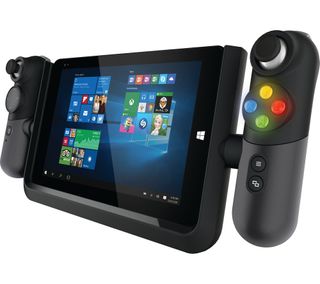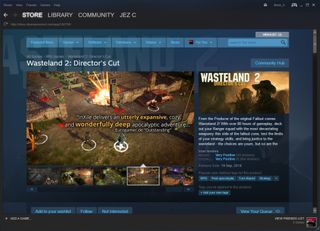Steam in your pocket: how Win32 PC gaming could energize Microsoft's mobile ambitions
At WinHEC 2016, Microsoft unveiled Windows 10 for ARM devices, opening up an entire universe of new possibilities.

Devices running on ARM are typically smaller and more power efficient than their bulky Intel cousins, at the cost of raw processing power. As ARM chips have become more powerful, Microsoft has finally bridged the gap between Win32 and ARM architecture. The company explained how new devices running on Qualcomm's latest Snapdragon processors can run programs like the full Office suite, full Adobe Photoshop, and "popular Windows games."
Few would argue against the notion that Microsoft has a good foothold in the mobile productivity arena but save for the purchase of Minecraft Pocket Edition, Microsoft has a minuscule presence in mobile gaming. What if you could fit an entire Windows 10 PC in your pocket?

Microsoft's mobile gaming efforts have so far revolved around the Windows app store. There are a few games that do function across Windows phones and PCs, but they're usually very casual titles. The few AAA 'core' games in the Windows 10 Store such as Gears of War 4 and Forza Horizon 3 would need to see significant compromises to run properly even on the new Snapdragon processors. And this is without considering inputs, UI scaling, and other hardware bottlenecks.
What if millions of lower-end Win32 Steam games could run on a future Windows 10 mobile device?
Windows 10 Mobile does support the Bluetooth stack that allows the Xbox One S controller to connect to phones, but to my knowledge, not a single game on Windows 10 Mobile uses it. Developers have largely abandoned the Windows 10 Store for mobile games, which puts a huge dent in the notion of consumers wanting to pick up a Windows-branded mobile device. What if millions of lower-end Win32 Steam games could run on a future Windows 10 mobile device?
Of course, you're not going to be running Battlefield 1 on your phone in the near term (it'll take more than a few years for that kind of power in mobile chips), but there are piles of classic games that have enjoyed a significant amount of success when ported to mobile on iOS and Android. Final Fantasy VII, Knights of the Old Republic, and even some modern, less-intensive games like Hearthstone are available on mobile platforms, in addition to their Win32 counterparts on Steam and other PC platforms.
At WinHEC 2016, Microsoft demonstrated how well World of Tanks Blitz runs on an ARM-powered Windows 10 PC. The possibilities for running less intensive mass market games like League of Legends or even World of Warcraft on lightweight, ARM-powered devices becomes clear. Standard 3D graphics API DirectX is already supported by the ARM-based Windows 10 Mobile.
Microsoft demonstrated World of Tank Blitz UWP to show how Windows 10 on ARM can render solid 3D visuals using an integrated mobile GPU.
Get the Windows Central Newsletter
All the latest news, reviews, and guides for Windows and Xbox diehards.
The announcements at WinHEC 2016 could provide a huge gaming boost to Windows on lightweight ARM devices, as the Win32 emulation layer would eliminate huge developmental barriers for existing games to be ported across to UWP, either natively or via a Win32 to UWP bridge like Project Centennial. Since these Win32 programs just work without any additional modifications, this emulation can, in theory, support Steam. Millions of gamers would be able to pick up and run less intensive titles right out of the gate.
Hardware partners will be able to build a range of new thin, lightweight, power-efficient and always-connected Windows 10 PCs that run x86 Win32 and universal Windows apps, including Adobe PhotoShop, Microsoft Office, and popular Windows games.
It's easy to envision how, eventually, larger Windows phones or phablets could leverage this new technology to produce new power-efficient gaming devices such as the Nvidia Shield or even the Linx8 tablet, albeit with an enormous library of classic Steam and GOG.com Win32 games that would run well on lower-end machines.
Naturally, these devices would need external controls as the majority of those classic games won't support touch inputs, but the possibilities are clear. There's no longer an OS-level barrier between mobile tablets, phablets, phones, and light Win32 gaming.


Games ported via Project Centennial to UWP are still Win32 at their core, meaning that they would also benefit from this new emulation layer powering full Windows 10 on mobile devices. A new focus on gaming on mobile devices, backed by Steam, could be the market share catalyst Microsoft needs to make Windows on mobile credible with consumers.
Xbox head Phil Spencer once said that he saw an opportunity for Microsoft to re-emerge as a consumer brand on the back of gaming, similarly to the way Apple leveraged music on the back of iTunes and the iPod.
(Apple's) investment in music early with the iPod and iTunes and everything that they did was an incredible growth opportunity for them, and they really sparked consumer delight and innovation in the product, both the industrial design and just the way the whole service worked. I think we've got the same opportunity with Xbox here at Microsoft.
Xbox's stand-offish approach to gaming on mobile exemplifies Microsoft's wider retrenchment in the mobile space, and this announcement paints a picture of a company waiting for the right technology to arrive before making the leap back into the fray. That new technology could be the developments we're hearing about at WinHEC 2016, with Win32 gaming touted as a pillar alongside Office and other creativity tools.
Microsoft has a huge opportunity to give PC gamers a holy grail type of mobile gaming device eventually — a pocketable version of Steam — and eventually boost their mobile consumer ambitions back into the spotlight, if — and this is a big if — Microsoft's execution is on point. We can only wait and see (and hope.)

Jez Corden is a Managing Editor at Windows Central, focusing primarily on all things Xbox and gaming. Jez is known for breaking exclusive news and analysis as relates to the Microsoft ecosystem while being powered by tea. Follow on Twitter @JezCorden and listen to his XB2 Podcast, all about, you guessed it, Xbox!